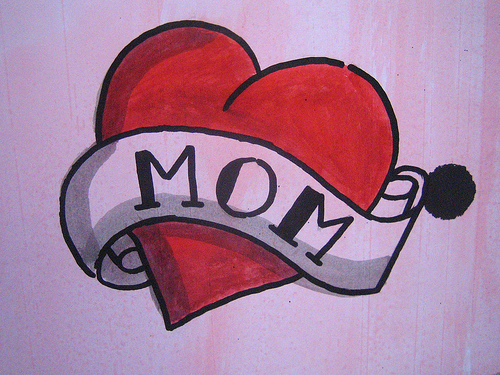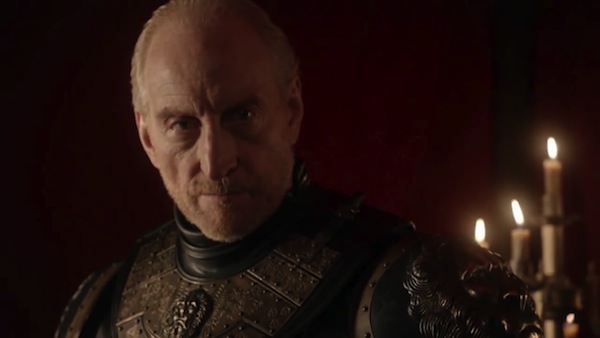Oh, Mother: Five of the Worst Momsters in Literature
(Image via flickr)
It’s sad but true: bad moms make for great stories.
I’m not talking about the kind of bad mom who made you eat your broccoli or picked you up from a high-school dance in her pajamas. I mean the really bad mothers you (hopefully) only see in books. The ones that take such pleasure in manipulating, belittling, or just generally screwing up their offspring that you can't help but assume the author took the advice to "write like your parents are dead" to heart.
Yes, they're terrible mothers, but with every abandoned baby and murderous rampage, these women make for page-turningly compelling reading. So for Mothers' Day, let's celebrate five of these literary momsters who definitely don't deserve breakfast in bed this year.

Ingrid Magnussen, White Oleander by Janet Fitch: To say that protagonist Astrid Magnussen has mommy issues is putting it lightly. Her mother, the emotionally distant poet Ingrid, takes post-breakup devastation to just plain awful lows when she goes totally wacko and murders her ex-boyfriend by covering every surface in his house with poisonous oleander sap (you know, because that's a totally simple solution).
But even though Ingrid's actions effectively condemn her twelve-year-old to a series of totally unstable and occasionally abusive foster homes, the last modicum of motherly tenderness is erased with the string of passive-aggressive letters she sends her daughter from the pokey. Astrid eventually comes to terms with her past and uses it to fuel a creative career as an artist, but (unsurprisingly) her body of work never includes a mother’s day card.

The Other Mother, Coraline by Neil Gaiman: The Other World that our heroine Coraline Jones discovers is great—at first. What’s not to love about magical toys and wonderfully attentive parents? Um, lots. The Other Mother isn’t just indulgent and impatient, she’s creepy-looking: long fingers with red nails? Pale-as-paper skin? Oh, and COLD BLACK BUTTONS WHERE SHE SHOULD HAVE NORMAL HUMAN EYES?
Other Mother is a scary one—and that’s before you even get to the whole imprisoning-children-behind-a-mirror-to-suck-out-their-life thing. Fortunately, she’s no match for the adventurous and courageous Coraline.

Liza Tillerman, Homecoming by Cynthia Voigt: Leaving four kids alone in a car at a shopping mall is a pretty terrible parenting move (even if you crack a window). But then again, if Momma Tillerman hadn’t abandoned Dicey, James, Sammy, and Maybeth, the events of one of my favorite novels of scrappy-kids-on-a-road-trip would never have unfolded!
Okay, but my selfishness as a reader aside, in the end (spoilers!), it works out pretty well for the characters, too: eldest sibling Dicey gets to flex her resourcefulness muscles, everyone learns some hard lessons about life, and they even run into a traveling circus! If that's not an idyllic childhood, well…okay, yes, Liza ends up catatonic in a hospital bed. But the title comes true for the kids, at least. Their estranged grandmother taking them in sort of counteracts the cruddy luck of being abandoned in the first place, so maybe Liza’s selfishness and detachment are forgivable as a path to a better life.

Corrine Dollanganger, Flowers in the Attic by V. C. Andrews: Yikes. The book whose title is practically synonymous with creepy blonde sibling incest would never have gotten its plot rolling without this kissing-cousin of a mom. Corrine ditches her kids at her mother’s house and proceeds to enjoy a vacation while the four children are starved, whipped, and otherwise abused at the hands of their grandmother, Olivia, who does lots of well-adjusted grandmotherly things like serve doughnuts powdered with arsenic and screech about her grandchildren’s sinning (which, okay, she was kind of right about).
Come to think of it, Olivia’s messed-up maternal instincts might explain a lot about why Corrine is so terrible at raising kids—especially given that the Dollanganger gene pool doesn’t get much fresh water, if you know what I mean.

Medea, Euripedes’ Medea: Speaking of synonymous, Medea is another mom who made her name by doing the least nurturing thing ever. Spurned by her husband Jason, Medea slaughters her own sons as revenge (because that's not cutting off your nose to spite your face, or anything) and then takes off in a dragon-winged chariot (because that's a thing people did back then).
Even by Greek myth standards, with all the baby-eating and Minotaur-making (ew), infanticide-as-revenge is still brutal (and only made kind of cool by the bitchin’ deus-ex-getaway-mobile). Gross and cruel though she was, Medea was nothing if not a trendsetter: even Wikipedia will tell you that “her filicide would go on to become the standard for later writers.” When it comes to poor parenting decisions, Medea is the mother of them all.
—
So there you have it. If you’re stuck on an idea for a Mothers’ Day card this year, how about a simple expression of gratitude that she isn’t one of these ladies?

Blair Thornburgh
BLAIR THORNBURGH is a graduate of the University of Chicago, where she earned a B.A. in medieval studies and delivered a pretty good commencement speech. She lives in Philadelphia.



